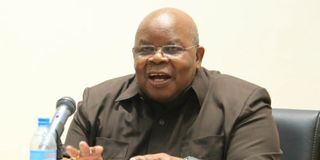Mkapa’s role in Tanzania’s new ‘lower-middle income’ status...

What you need to know:
It was during Mr Mkapa’s days at the Dar es Salaam State House from 1995 to 2005 that some of the most important decisions designed to lay down the foundation for Tanzania’s social and economic prosperity, were made
Dar es Salaam. Former President Benjamin Mkapa died in the early hours of Friday, leaving Tanzania at a relatively improved economic state. Mr Mkapa, along with other past and present leaders, worked diligently to turn around Tanzania’s economic fortunes that culminated in the World Bank’s elevation of the country from a Low Income Country (LIC) to a Lower-Middle Income Country (LMIC) just four weeks ago.
It was during Mr Mkapa’s days at the Dar es Salaam State House from 1995 to 2005 that some of the most important decisions designed to lay down the foundation for Tanzania’s prosperity, were made. The World Bank defines countries’ economic status depending on the levels of their Gross National Incomes (GNI)
LMICs are those with a GNI per capita of between $1,036 and $4,045, while Upper Mid-dle-Income Countries (UMIC) are those economies with a GNI per capita of between $4,046 and $12,535. High-income economies are those with a GNI per capita of $12,536 or more.
Government figures show that in US dollar terms, Tanzania’s average per capita income increased from $1,078 in 2018 to $1,121 in 2019. In GNI terms, World Bank figures put Tanzania’s GNI at $1,080 in 2019 up from $1,020 in 2018.It was unfortunate that Mr Mkapa could not live to see Tanzania graduating further from a LMIC into an UMIC. What remains unshaken, however, is the fact that the country has graduated into a LMIC basing on a sound economic performance whose foundation was to a great extent laid down during Mr Mkapa’s tenure.
From privatisation – which yielded both positive and some negative outcomes – and to attracting investments through the formulation of the Investment Act in 1997, Mr Mkapa saw it all.
‘My Life, My Purpose’ memoir
As rightly pointed out in his autobiography: ‘My Life, My Purpose: A Tanzanian Presi-dent Remembers’, Mr Mkapa inherited dry state coffers.With revenues of only Sh331 billion for the entire financial year 1994/95, delayed salary payment for civil servants was not uncommon.With an inflation of 27.4 per cent, government employees could only find the going tough.
Tanzania was on the list of the Highly Indebted Poor Countries (HIPC).As such Mr Mkapa and his team had to employ various strategies to get things going, the result of which is part of why Tanzania is now flourishing. One year before his coming to power, Tanzania’s economy grew at only 1.6 percent but with his transformative approach, the economic growth rate aver-aged 4.28 percent during his first five year term in office.
With investors’ growing interest in Tanzania, President Mkapa’s second five year term registered an average growth rate of 6.6 percent. That tempo was maintained throughout the past15 years of President Mkapa’s successors (Jakaya Kikwete and John Magufuli) hence Mkapa’s role in Tanzania’s attainment of the lower-middle income status it is in now.
With the approach of tack-ling the challenge from all fronts (locally and internationally), Mr Mkapa had to personally engage various international figures and organisations in order to put the economy on a smooth footing. While conceding that it was not a walk in the park to strike cordial working relationships with the World Bank and the International Monetary Fund (IFM) due to the fact that the two organisations were in bad books of Tanzanians and Africans in general, President Mka-pa says there was no any other way but to take the bull by the horns.
“It was not easy… because these two organisations were the bête noires to many Tanzanians, indeed Africans. Nevertheless, these working relation-ships were vital if I was going to get our economy on a stronger footing,” writes Mr Mkapa.Understanding that Tanzania was heavily indebted, Mr Mkapa moved quickly and started hold-ing talks with the then World Bank President, Mr James Wolfensohn and the then IMF managing director, Mr Horst Kohler.
Economic diplomacy
In line with Tanzania’s economic diplomacy policy, Mr Mkapa secured the support of the United Kingdom, China, the Netherlands, Norway, Sweden, Denmark, Finland and Germany. He noted however that during that period, there were some people back home who saw him as a ‘traitor’ who was collaborating with the ‘enemies’.
“Though I am sure there were some Tanzanians who looked at askance at me, saying ‘this man is collaborating with the enemies, the World Bank and IMF,” writes Mr Mkapa.At a time when a number of development partners had agreed to grant debt relief to Tanzania, Mr Mkapa had one more bottleneck to defeat: winning the support of the United States of America.
He decided to personally engage the-then US President, Bill Clinton, a chance he got during the United Nations General Assembly in September 1999.“I explained to him that we had met the stipulations of laid out by the World Bank and the IMF but when we attended the meeting of the Paris Club it was the USA that blocked us from obtaining the debt relief; why was this?” Mr Mkapa writes as having asked Mr Clinton.
The results
These initiatives finally yielded positive results and in 2001, Tanzania was granted a debt relief of $3 billion which reduced the country’s total external debt by 54 per cent. It also reduced the amount to be paid as interest on the loans. With sound finance management and concerted efforts to collect government revenues on a sustainable basis, Tanzania’s economy started picking, with revenue collections for the 2005/06 financial year reaching Sh2.125 trillion.
Mr Mkapa left office at a time when the country had enough foreign exchange reserves to cover 5.3 months of the country’s import cover while inflation rate had been contained to single digits. This is the foundation that Mr Kikwete and Dr Magufuli have been building on.




